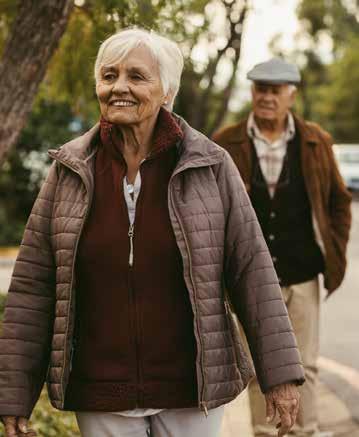
6 minute read
Help for carers
3. Write down the help and support that others could provide for you that you could arrange yourself. For example, a friend or family member, a local community group or a simple piece of equipment.
If there is something you’ve written down that you can’t find a solution for, please contact us on: 0300 123 2224.
A carer is anyone who helps another person, usually a relative or friend, in their day-to-day life. This is not the same as someone who provides care professionally or through a voluntary organisation. Carers are a valued part of the community. Many carers do not think of themselves as carers; they see caring as an extension of their role as partners, parents, children, relatives and friends of the person they look after. Many don’t know that there is information, advice and support available.
The Somerset Carers Service is a universal service available to all unpaid carers, whether they care for a few hours a week or provide a substantial amount of support. It is provided by the Community Council for Somerset. It can provide quality local information, emotional support and practical advice to help people in their caring role and can point carers in the right direction to get help or information. The service also works closely with other specialist carer support networks.
This service is to support carers; it does not replace assessed care and support provided by the local authority.
Somerset Carers Service
Tel: 0800 316 8600 Text: ‘Carer’ to 78070 Email: carers@somersetrcc.org.uk Web: www.somersetcarers.org
For information about carers’ assessments, see page 48.
Carers’ information, support and counselling
There’s a list of information sheets for carers at: www.somerset.gov.uk/carers which can be viewed online, saved or printed. They help to explain who a carer is and some of the things carers might have to deal with in their caring role, as well as giving advice about what support is available and the services we can provide for carers in Somerset. If you would like us to send you copies of these publications, please phone us on: 0300 123 2224. available to carers. These can be designed to help with their caring situation. For example, basic first aid, maintaining personal wellbeing, and other opportunities that offer personal development. Phone us on: 0300 123 2224 to find out more.
Supporting someone with a mental health condition
Carers’ assessment workers are based in community mental health teams. They specialise in assessing the needs of carers who support someone with mental health issues and can advise carers about:
• day services;
• residential care and short breaks; and
• contacting social workers and community psychiatric nurses.
Carers’ champions
Most GP surgeries in Somerset have a member of staff who is a carers’ champion. They can add you to the Carers Register. This will alert a GP that you are a carer when you attend an appointment and may also help you access preferential appointment times and carer health checks. The carers’ champion can provide information about where to go to find out more about carers’ services.
Breaks for carers
There are different ways of getting a break from caring. The break could be anything from a few hours to a few weeks.
Contact the carers’ support service for the most up-to-date information. Carers UK provides advice for carers. Visit: www.carersuk.org or phone: 0808 808 7777.
Young carers
We have young carers’ co-ordinators who:
• assess the needs of young carers;
• support young people (18 years old and under) who have caring responsibilities;
• promote recognition and awareness of the young carer’s needs and achievements; and
• work alongside other agencies to develop schemes and services that support young carers.
Young carers’ co-ordinators provide information, advice and support, including:
• answering questions and giving advice;
• speaking up for young carers so that ideas and needs are heard;
• introducing young carers to one another; and
• organising groups and activities to have fun and a break away from home.
You can find out more about the young carers’ co-ordinators by phoning: 0300 123 2224.
Health and wellbeing
We can all make small changes to diet and lifestyle which can help improve physical and mental health. For example, you can reduce your risk of long-term health conditions, such as heart disease, stroke, cancer or diabetes, by making healthier choices.
Things that can influence health and wellbeing include:
• spotting the signs and symptoms of illnesses;
• staying active;
• maintaining a healthy weight;
• getting out and about;
• spending time with others; • staying warm;
• having an adequate income;
• having a healthy diet; and
• staying safe from falls.
Further information is available on the Somerset Community Connect website: www.somersetcommunityconnect.org.uk and services are in place across Somerset.
Keeping active as we get older is really important for physical and mental health.
Visit the Somerset Activity & Sports Partnership (www.sasp.co.uk/activities ) and Healthy Somerset These websites offer information about activity opportunities across Somerset, including activities for people who are less mobile.
Emotional and mental health
As with our physical health, there are things we can do to help improve our mental health. What is good for our bodies is also good for our minds. Here are some steps we can all take:
1. Connect – connect with the people around you – family, friends, colleagues and neighbours;
2. Be active – step outside. Go for a walk. Work in your garden. Go dancing. Exercise makes you feel good;
3. Take notice – be aware of the world around you and what you are feeling. Remark on the unusual.
Notice the changing seasons. Reflecting on your experiences will help you appreciate what matters to you;
4. Keep learning – learning new things will make you more confident, as well as being fun. Try something new. Rediscover an old interest.
Learn to play a musical instrument or how to cook something new; and
5. Give – seeing yourself and your happiness linked to the wider community can be rewarding and creates connections with the people around you. Thank someone. Smile.
Volunteer your time. Join a community group.
Look out, as well as in.
There will be times when you are worried about your own, or someone else’s, mental health. On these occasions, you may want to visit your GP to talk about the situation; they will be able to advise on what to do next and will talk with you about what help is available.
The GP might recommend:
• support for your emotional and mental wellbeing through the wide range of community organisations in Somerset. These are often delivered in local communities by voluntary and non-profit organisations. You can find more information on the Somerset Community Connect website: www.somersetcommunityconnect.org.uk ;
• Talking Therapies, which are provided by Somerset
Partnership NHS Foundation Trust and are free and confidential. A range of therapies is available, including cognitive behavioural therapy. As well as your GP referring you, you can contact talking therapies yourself by phoning: 0300 323 0033 or using their online form: www.somersetft.nhs.uk/ somerset-talking-therapies ; and
• specialist mental health services provided by
Somerset Partnership NHS Foundation Trust, which your GP can discuss with you.











